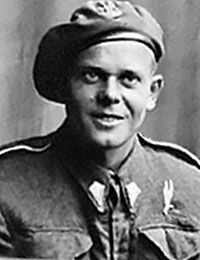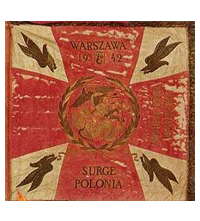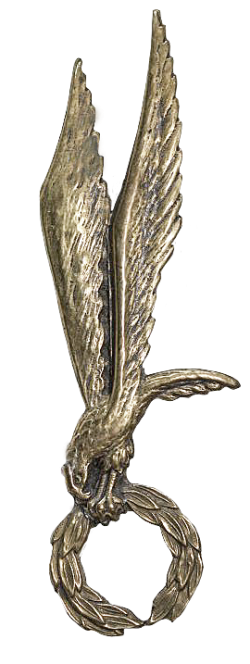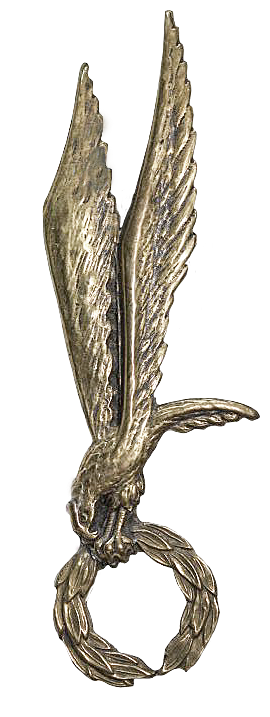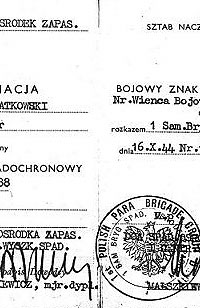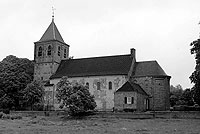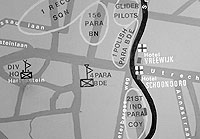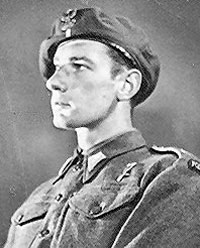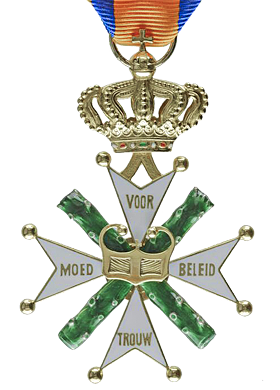It was the decree of fate for me to have the two maturity exams in my life – both with positive result. The first took place in May 1939 in my home-town Lublin (the Staszic Memorial Male Secondary School), the second in November 1943 in Scottish Dunalastair House (Polish... Female Secondary School). The first maturity certificate was lost together with pre-war utensils, souvenirs and documents, the second I still keep. There is a round stamp with the label in the brim which says: “The Ministry of Religion and Public Education”. It was one of the few ministries working abroad during the Second World War. Between the two exams there was an eight-year break full of events and changing landscapes: from the green lands of Lubelszczyzna and snow-covered Russian taiga to Scottish moors.
Before I tell about the second exam I will shortly present my life during these eight years. It will take little place but all these years it is a long time and an exam takes only one day. After the first, and I thought the last, maturity exam I study in the Central Trade School in Warsaw. During carefree holidays I stay in Brzesc (Brest) on the river Bug, where we moved with my whole family. I travel through Polesie by bike, car and in the canoe mainly with the group of my friends of both sexes. After obtaining vote of acceptance I start to prepare to my Master’s degree and I take up work in Warsaw. As a result of an adjournment of my army service due to my studies in October 1939 I am beyond any allocation and according to radio appeals I leave the capital and head to Brzes´c´ on foot. At the beginning of the winter 1940 I am in the soviet prison from where they send me, on the strength of an administrative decision, to “inspravityelno-trudovovo” lager in Sukha-Bezvodnaya. Despite pneumonia, hunger ulceration and swelling I survive till my release in 1941 with the certificate which says: “Na osnovanee doghavora myezhdu sovietskim a polskim pravityelstvom admnistiruyets'a polskovo grazhdanina...”. After various ups and downs I find myself with work appropriation to Kazakhstan kolkhoz where I meet Polish people sent there during the war for so-called “free-deportation” and I work with oxen on steppe. Later, looking for Polish Army, news about which reach everwhere, I travel to Turkmenistan on Amu-Daria and avoiding digging water canals on the Karakum Desert I find myself in semi-military group in Kirgizia under the Tyen-Shan mountains.
On surviving the typhoid epidemic which took many fatalities, I wondered for several days to Lugovoye where there is the last Polish recruitment board. It is the last day of March 1942. I get the C category but I am accepted and within few days I have an English uniform with my old rubber boots on feet. Soon I am in Uzbekistan as a real soldier (nevertheless I practise with a wooden rifle) first in Guzar, then in the 6th Division of Lviv Children in Shakhriziabs. Here, on the XVI-century ruins of the Timur’s palace a Polish trumpeter plays “hejnal mariacki” "St. Mary’s bugle-call" every noon. I am still hungry as we have to share our small food rations with overflowing Polish people removed from Russia. At the end of September 1942 we evacuate to Persia through Turkmenian harbour Krasnovodsk on Caspian Sea. On the ship I am struck by the severe attack of malaria and right from the beach I am taken to Hindu military hospital arranged under the tent on the suburbs of Teheran. After some time I recover but I have to part with several teeth of mine weakened by prolonged fast. Malaria will come to me once again in Scotland but Polish dentist will put in my missing teeth. In the meantime Polish army, which was evacuated from Russia and renamed as the II Corps as opposed to the I Corps located on British Islands, moves to Iraq. My group of the recovered gets into the cars and goes through Kazvin, Hamadan, Kermeshan crossing the Zagros mountains just before the border. We were incorporated into the reserve centre and placed under tents on the small hills near the Chanakin town, about 180 kilometres from the Iraqui Kurdian border.
There were also detachments of the 5th, 6th and 7th Division located in the neighbourhood. Here we continue military training, stand sentry by the oil refinery providing oil for the whole Mediterranean war theatre or convoy supplies of military equipment from Basra harbour on the Persian Gulf. Sometimes we seat by the same bonefire with the Hindu soldiers (which wasn’t approved by British officers) or we buy them stuff from our canteen available only for the “whites”. In the I Corps there was enough officers, they even had officers company, but we lacked privates. In spring 1943 together with other soldiers I received an allocation to Great Britain. The Mediterranean Sea was then controlled by German and Italian ships and, to get to Europe, we had to sail around Africa. Transport nr 67 carrying, except the British, 800 Polish privates and 10 officers set off from Basra in Bombay on 3-th of April 1943. Everyone gets shorts and cork helmets. After unloading the ship they take us to military camp in Deolali, the town situated about 200 kilometres to north-east, near railway track dividing to Nagpur and Djabalpur in central India. In the camp everyone has his own tent with mosquito-net and, unofficially, a Hindu servant ready to help for few “anna” and something to eat. We have the opportunity to visit Bombay(beautiful government buildings raised by the English, barely dressed people sleeping on the ground, wandering skinny holy cows) and Deolali (carts dragged by white oxen decorated in flowers, monkeys flocking on the trees on the city squares and serpent-charmers with snakes in round baskets). We stay in the camp for two weeks and we board the “Straighthearth” ship in Bombay, this time in large convoy with few destroyers as an escort. We head to Durban in South Africa. We spend here another two weeks in a nearby camp in Clairwood. Here we have the possibility of visiting beautiful, white and modern city of Durban (with its racism and the sound of little bells decorating the legs of the black jinrickimen) and walking in gentle air on the road crossing green fields near the camp.
We then travel to Europe by ourselves. An “Orion” a large, armed troopship equipped with radars allows us to avoid meeting Japanese or German submarines. At the very beginning of our voyage instead of doubling Cape of Good Hope the ship heads far to the south, to Antarctic until we get cold in our tropical clothes. Luckily we get rid of the intruder, get back on the track and without any trouble reach Freetown (Sierra Leone). After stopping for several days without unloading, at the end of June we move to Liverpool in middle-west England. This part of the trip from Durban was favourable for me because first: due to a lot of rolling many of my friends avoided food so I could eat as much as I wanted; second: I was a part of a little Polish group taking turns with the British with four-barrel anti-aircraft “v-k-m” (heavy machine-guns) set on the upper deck so that we could sleep a lot in empty nooks of the ship. All in all the whole trip took three months during which we crossed the equator twice but nobody took care for the Neptune to perform his duties. From Liverpool in green England we go to Achtermuchty in Scotland. We find out there about tragic death of general Sikorski. I also get there my first ID (Russian ”udostovyernye”, useless on the Island, was retained by recruitment board in Lugowoye and I have never seen it again). There is few details in our military books. There is nothing more apart from a picture (I would never look that good again), current number, name and surname, date of birth (but without place of birth), description of the look and letters R.C. (the abbreviation of English words “Roman Catholic”). They would later add “blood type A”. But there is no time for thinking. I get the allocation to the 3rd battalion of Pierwsza Samodzielna Brygada Spadochronowa (1-st Independent Parachute Brigade). It contained mainly soldiers from the Near East. My company stays in a small Scottish town Freuchie near Falkland. We get through intensive shooting taining, parachuters knock-up in Largo and tactical group training with Polish and British partners. One day we found out that soldiers having “small” or “big” maturity exam with no evidence of it can get confirmation by taking an external exam before special board appointed by the Ministry. I applied without hesitating but since 1940 I rarely had a book or periodical in my hand, especially in Polish language.
It wasn’t until in Achtermuchty that I managed to get “Dzieje literatury polskiej” (“The history of Polish literature”) by Wojciechowski edited in London by Kolin (while rewriting this text I discovered that I learned to my “matura” from the same book - a note of the son Krzysztof Jan) and of course a bit of Polish light literature but-of course-no maths books! Anyway, while buying these books I didn’t think about any exam. Meanwhile, it occurred that on Dunalastair House exam I would have to deal not only with Polish and maths but also with biology, Latin, French, philosophy or even... religion! To get on the exam we used a battalion’s truck and in a group of a dozen or so we set off under the command of a very pleasant education officer Lt Walter who derived from a well-known merchant family from Warsaw (earlier he gave me “Vademecum ortograficzne” (an orthography book) edited in 1941 by the Wojskowe Biuro Poropagandy i Os´wiaty; I still keep in remembrance). We drove through Perth, Dunkeld, Pitlochry. The boarding-school for girls was situated in palace; our group was located in a small building in park. Despite the director’s, who was a priest, trying to keep us in a kind of isolation, contacts with some of the girls were soon established, addresses exchanged and we finally had school-books. They proved to be very useful especially to learn... religion. The second priest, who was a prefect, organized a mass in a school chapel and put us stealthily pieces of paper signed with our names which included exam questions from religion. I had the topic of “Lord’s grace” and I mastered it as well as to get “B”. The same mark I received only from Latin because I could read and translate once well-known to me speech of Cycero against Catilina. From other subjects, including Polish, I got (to my disgrace!) only “C”.
I must, however, admit that my easy getting through Mathematics surprised me. Mainly the examiners weren’t too harsh nevertheless they put down some of the candidates. I don’t remember how long did we stay in Dunalastair House. After finishing the exams we waited relaxed for the car to take us to the our corps. It was supposed to be on place in the late morning so Lt Walter took us to the near Grampian mountains summit – Schichalion. Rob Roy, who was a part of the history of Scottish-English border, was said to have hidden there. In the afternoon they planned dancing for girl-students from Dunalastair House. Inspite of their requests, supported by Lt Walter, the priest headmaster denied letting boys take part in it - girls were to dance with each other. Because the car came for us after dark girls tried to convince the priest once again but they didn’t succeed and we went back without waiting. It happened that the narrow road stuck at a straight angle to the other which ended with a small stone wall and our car bumped into it and stopped breaking the wall of a nearby house. Several people were injured and a fresh exam-taker Ignacy Zebrowski broke his rib.
In December 1943 I was sent for the II training of the Brigade Officer Cadet School in Earlferry House (Elie). In October 1944 the twenty-four of us – Officer Cadets took part in the battle of Arnhem in Holland. Among the three of them who died there were two who took an external exam in Dunalastair House: Ignacy Zebrowski and Tadeusz Ostojski. Such were the “tourists of General Sikorski”..
Memories of Bartek
There are different soldier stories. Sometimes they try to frighten with the untrue picture of war. Sometimes I also hear untrue stories of some of the parachuters. One of them, for example, to help the English in Oosterbeek swam across the river Rhine with knife in his teeth. The other victorously landed on heads of surprised German gunners near some famous bridge. The third modestly told the Dutch how he kissed their ground after jumping whereas he was on the sea by then and didn’t even once visit Holland through the whole war.
That is why I decided to make an introduction to my friend’s Bartek report. The fate has connected us in the Brigade for good. We were in the same company and-regarding lack of our Polish documents - we passed together our maturity exam for the second time in Polish female secondary shool in Dunalastair House. Together we used to spend our short, sightseeing holidays. In the same team we went through parachute and Officer Cadet training in Earlsferry House. We jumped together from the same plane in Driel and sat in the same anti-aircraft trench. Finally we parted before crossing of the river Rhine. Bartek describes his, full of obstacles, way to our unit and he mentions shame that he felt about not using his gun in Driel.
There is another reason for this preface. Bartek is now a retired doctor-psychiatrist, former headmaster of an America hospital, married to the American woman, father of six children and grandfather of several grandchildren. He has been out of Poland for years (recently, for a long time, near Atlanta in Georgia where I visited him and where there are a lot of Polish people living). He is not quite sure of his Polish language so he asked me to literary draft his memories. He wrote them after my suggestion during his visit with his family in Lodz (2002). And he is as unconventional as his way to the Brigade. He is tall, with characteristic big nose and behaviour which differs from this commonly accepted. It was him who during the baloon jumps in presence of the Prime Minister shouted loudly in an Indian manner. When he was in Scotland he played the piano like earlier at home. Now, when he retired, he deals successfuly with painting and sculpting and keeps his own studio. In addition, his name is not Bartek although under this name he is known to his companions from the camp in Miranda del Ebro, his friends from the Brigade and new acquaintances in USA.
It is true that he was born on the day of St.Bartholomew and traditionally he should have this name. It was well known to his godparents but on the way to church they called at the bar and finally forgot the name so they named him after his father Vladislav. And that is why the author’s of these memories name is Vladislav Piotr Mazur and his whole family and friends, including me and my son, call him 'Bartek'.
Slawomir Kwiatkowski
